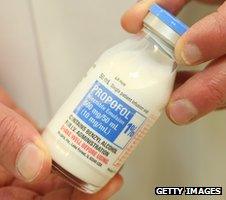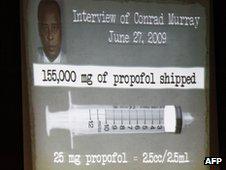The drugs found in Michael Jackson's body after he died
- Published

Propofol is a fast-acting hospital sedative used before anaesthetics
Michael Jackson's physician, Doctor Conrad Murray, has been found guilty of involuntary manslaughter by a jury in Los Angeles.
During the trial they were shown images of the singer lying dead in a hospital and rehearsing the day before his death.
The prosecution team claimed Conrad Murray was an incompetent physician who used an anaesthetic called Propofol without the proper safeguards.
The defence said Jackson caused his own death by taking a drug overdose, including Propofol, after Murray left his bedroom on the day of his death.
Find out what drugs were found in Michael Jackson's body.
Propofol
Propofol is a fast-acting hospital sedative, administered intravenously and used before anaesthetics. It was first used widely in the late 1980s.
The drug, which Conrad Murray gave to the singer to help him sleep, is made by the pharmaceutical company AstraZeneca and is also sold under the brand name Diprivan.

The prosecution team said Murray used large quantities of Propofol
Experts say Propofol is extremely powerful and not meant for use outside hospitals and clinics.
Propofol was referred to by Michael Jackson as his "milk" because of the milk-like appearance.
The drug is administered either by intravenous drip or by being injected ahead of an anaesthetic, or to keep a patient anesthetized during an operation.
It is a preferred sedative in operating theatres because it is well tolerated and allows patients to recover quicker.
It's commonly used in outpatient surgery or as a sedative for certain examinations.
Propofol is also used as a painkiller or anti-anxiety drug in post-operative care.
Lorazepam
Conrad Murray told police in 2009 that he gave Michael Jackson other drugs known as benzodiazepines, which are also used as sleep aids.
But when they did not work, he claimed Jackson demanded Propofol.
Murray's defence lawyer Ed Chernoff said the singer swallowed several pills of Lorazepam on the morning of his death, enough to put six people to sleep.
It is widely used as a sedative and muscle relaxant.
Also known as Ativan and Temesta, the drug is used short-term for insomnia, anxiety, seizures and for sedating aggressive patients.
Midazolam
Midazolam is used in a similar way to Lorazepam.
It is widely used as a sedative and to treat seizures.
Also know as Dormicum, Hypnovel and Versed, the drug is also used short-term to treat severe insomnia and anxiety.
Jackson was given four milligrams of the drug on the morning of his death.
Diazepam
Diazepam is better known as Valium.
It's used as a relaxant for patients suffering from insomnia and anxiety as well as seizures.
Michael Jackson was given a 10 milligram tablet of Diazepam at 1.30am on the morning of his death because he couldn't sleep.
Lidocaine
Lidocaine is a local anaesthetic and is sometimes used to treat skin inflammations.
It is used by dentists to anaesthetise patients' gums.
Michael Jackson had a dose of Propofol diluted with Lidocaine at 10.40am on the day of his death.
Ephedrine
Ephedrine was also found in Michael Jackson's body.
It is primarily used as an appetite suppressant and stimulant.
- Published8 November 2011

- Published24 August 2011

- Published26 July 2011
